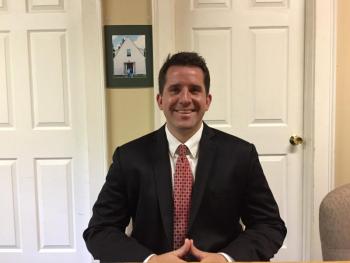Jonathan Liberman, candidate
Republican Jonathan Liberman of West Bath is running for election to his office of District Attorney for the Midcoast counties – Sagadahoc, Lincoln, Knox and Waldo. He was appointed by Gov. Paul LePage in 2016 at the elevation of Geoffrey Rushlau to judge for the Maine District Court. Before that, Liberman was a deputy D.A. under Rushlau. He also served as an assistant D.A. in Knox and Cumberland.
He said that since taking over from Rushlau, he has implemented a few policies for his offices. Primary among them is a victim/witness privacy policy. “We no longer identify child witnesses by name in public documents,” he said. “We also seek protective discovery orders, and my ADAs are directed to oppose fishing expeditions.” Mental health records are also limited to three years up to the incident.
Liberman has orchestrated the Midcoast Child Advocacy Center, a multi-disciplinary organization serving children affected by sexual abuse. At the centers, one in Wiscasset, one in Rockland and a third to open in Belfast in the spring,forensic interviews are conducted in a child-friendly environment. Parents and others watch from a different room. Liberman said this makes it possible for the child to undergo just one interview, rather than multiple ones with doctors, detectives and DHHS personnel. The program also has wraparound services for the child, including case review, and witness advocates. “Ours was one of the first offices to sign a memorandum of understanding with Sexual Assault Survivor Services of Midcoast Maine,” Liberman said.
Liberman said he is committed to the rule of law. As prosecutor, he headed up the case against Randy Wheddle, a Tennessee truck driver who drove under the influence of drugs and alcohol, killing two people in Knox County. Wheddle was sentenced to the longest vehicular manslaughter term in Maine history. Liberman, who said he works on the most serious cases, worked with his deputy D.A., Jeff Baroody on the case.
Liberman is committed to keeping people out of jail unless it is absolutely necessary. He said many people are diverted from jail now, using support services from the sheriff's offices, police stations and drug treatment organizations like Addiction Resource Center. Lincoln County Recovery Collaborative also works with police departments to do peer to peer recovery, something like an Alcoholics Anonymous model. “With guidance, people can get out of jail and into treatment,” he said.
Lincoln County provides a great model for the rest of the district, when it comes to drug diversion, he said.
Liberman was pleased a drug court seems to be on its way to the Midcoast as well. It would likely be sited in either Lincoln or Knox counties. “I’m leaning toward Lincoln County because of its existing infrastructure, but it will all depend on space and other issues,” he said. All four counties would use the court, which would provide a higher level of supervision for people with addiction disorders than diversion programs can. Liberman said candidates would be nonviolent offenders. Sex offenders and other violent criminals would not be considered good candidates. The early success of drug courts in Maine led to their expansion.
Liberman said that in addition to mental and drug treatment, there are programs for men who have been proven to be domestic violence abusers, called “Certified Batterer’s Programs," and intervention programs for all kinds of family issues. “There are counseling programs for people who want help,” he said. “New Hope for Women offers programs for both male and female offenders. ‘Choices’ is for male offenders and ‘Time for Change’ is for female offenders.”
Sagadahoc and Knox counties also have Domestic Violence Courts, along the model of the drug courts, with greater supervision of offenders and greater support for victims.
Liberman said he is able to work with his ADAs because he has been through the ranks. “I never ask someone working for me to do something I wouldn’t do, or didn’t do. I’ve been a prosecutor for my whole career, starting as a student in Cumberland County. I work with ADAs and deputies who need guidance, and I take the lead in certain serious cases.” He said he understands when people get frustrated that someone dangerous is out of jail because of deferred disposition, or because the case didn’t move forward. “To successfully prosecute a case, we need strong evidence,” he said. “I’ve prosecuted cases where witnesses dropped out of the trial, even left the state, using medical records, police photos, and more. But we’re more likely to get a conviction when witnesses and victims are part of the team.”
Event Date
Address
United States
























